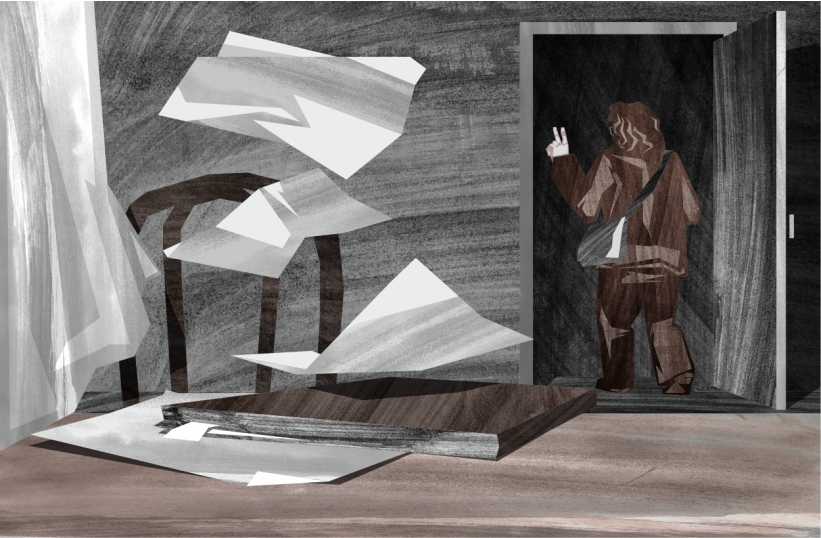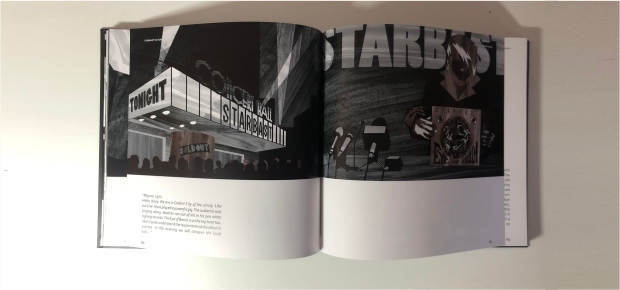AUM
StarBast III
Publisher:
StarBast Publishers
StarBast Publishers
AUM
Holger Schmidt
Published: 2024
Originally published in German and translated to Russian
by N. Dulesov
Translated into English by Y. Grigoryeva
Illustrated by Dmitry Chursin
Cover & book design by Dmitry Chursin
Printed and bound in Russian Federation
by StarBast Publishers (Ekaterinburg)
by N. Dulesov
Translated into English by Y. Grigoryeva
Illustrated by Dmitry Chursin
Cover & book design by Dmitry Chursin
Printed and bound in Russian Federation
by StarBast Publishers (Ekaterinburg)
Copyright © 2024 by StarBast Publishers
Idea, text, lyrics & music copyright © N. Dulesov 2018
Text copyright © “Holger Schmidt” 2022
Illustrations copyright © Dmitry Chursin 2022
Cover and book design copyright © Dmitry Chursin 2022
Text copyright © “Holger Schmidt” 2022
Illustrations copyright © Dmitry Chursin 2022
Cover and book design copyright © Dmitry Chursin 2022
After the breakup of the legendary band StarBast, its members are scattered across the world, each struggling with memories of both glory and tragedy. The main character, Koeb Vilde, suffering from memory loss and now a wanderer, embarks on a spiritual journey along the Way of St. James. His quest to find himself and reconnect with his roots intertwines with themes of meditation, destruction, and rebirth.
Simultaneously, the stories of the other band members unfold: Bastian Steppenwolf, once the leader of StarBast, travels across Europe in search of his son, while carrying out a mysterious task. Hermann Schildkröte, the band’s archivist, reflects on how the music they created became a symbol of resistance against oblivion and a fight for freedom. Their paths cross with the spirits of poets and artists of the past, such as Nasimi and Picasso, whose works serve as spiritual beacons in their journey.
The story of the band and its members is interwoven with great cultural events, where music serves as a means of resisting chaos and the loss of memory. Through recollections, philosophical reflections, and the search for truth, AUM explores timeless questions of sacrifice, creativity, and the pursuit of freedom.
Simultaneously, the stories of the other band members unfold: Bastian Steppenwolf, once the leader of StarBast, travels across Europe in search of his son, while carrying out a mysterious task. Hermann Schildkröte, the band’s archivist, reflects on how the music they created became a symbol of resistance against oblivion and a fight for freedom. Their paths cross with the spirits of poets and artists of the past, such as Nasimi and Picasso, whose works serve as spiritual beacons in their journey.
The story of the band and its members is interwoven with great cultural events, where music serves as a means of resisting chaos and the loss of memory. Through recollections, philosophical reflections, and the search for truth, AUM explores timeless questions of sacrifice, creativity, and the pursuit of freedom.
Eri got up from the table and went to the window. She was looking out the window, peering at the silhouettes of houses and trees emerging. A dove was sitting on the windowsill.
Galapagos looked at his rejuvenated hands and reflected that most likely he was a good musician. Then his gaze shifted to the spine of the notebook with the inscription "STARBAST III" sticking out of his bag.
"I will never be a good writer," he said with confidence.
With an old man’s groan Galapagos got up from his chair, took the manuscript out of his bag and put it on the table. He walked slowly towards the door, barely lifting his left hand.
Galapagos looked at his rejuvenated hands and reflected that most likely he was a good musician. Then his gaze shifted to the spine of the notebook with the inscription "STARBAST III" sticking out of his bag.
"I will never be a good writer," he said with confidence.
With an old man’s groan Galapagos got up from his chair, took the manuscript out of his bag and put it on the table. He walked slowly towards the door, barely lifting his left hand.

p.208-209
“So, we set sail on 'ARGentinO'. The nearest destination was Buenos Aires, which means 'good winds' in Spanish. The captain of our ship was an old sailor, Robert. One day he invited us to his cabin to talk, as he put it. After drinking a little and treating us to his wonderful drink, he told us a story that happened to him in 1936, when he was still a simple sailor on the same ship. His ship was then heading to Argenitina. Among the many people who found themselves on board the ship, there was one mysterious fellow traveler. Rumor had it that the great poet Garcia Lorca had lost his memory! Wounded, he was taken to a ship leaving for Argentina. It was more like fleeing a continent in turmoil. At that time, for most of the passengers, who were essentially refugees, leaving their native shores was the only way to escape from terrible events taking place in Spain at that time. There was hope to start a new life, even without a name or the past. While they were sailing, Lorca was in a perilous state. The sailor Robert was assigned to him to take care of the poet, feed, give to drink, monitor his condition. Lorca did not let go of the sailor's hand, repeating the same verses in his delirium. Numerous times. Robert remembered them. He had never told anyone about it, however. It was his secret. Now that Robert, as he put it, has gone on his last journey, he was ready to share that poem with Koeb so that he could write a setting. Koeb was delighted with such a generous gift.”

p.162-163
“He is eight or nine. He and his father took off for a short hiking trip. They often left home on fine summer days to be together, to talk about what seemed important. And that journey was not without an adventure.
They were crossing a small swamp when Koeb, raising his foot to take the next step, discovered that his shoe was missing. It was sucked into the quagmire. Until evening, Koeb circled around there trying to retrieve it, but to no avail. He had to return home without a shoe. Koeb was expecting punishment. But his father did not scold him. Moreover, in order to support his son, he prepared hot milk tea for him, put him to bed, gently wrapping him in a blanket, and told him the story of Jason, who had also lost his sandal. Then there was the story of the centaur Chiron, Jason's teacher, who gave up immortality in exchange for the release of Prometheus. Then there was the story of Prometheus, and how he'd stolen fire from the Gods of Olympus. That Fire was a symbol of enlightenment carried to the people by poets of different times. One of these poets was Nasimi.
NA-SI-MI... Koeb's lips were involuntarily whispering the poet's name in syllables.”
They were crossing a small swamp when Koeb, raising his foot to take the next step, discovered that his shoe was missing. It was sucked into the quagmire. Until evening, Koeb circled around there trying to retrieve it, but to no avail. He had to return home without a shoe. Koeb was expecting punishment. But his father did not scold him. Moreover, in order to support his son, he prepared hot milk tea for him, put him to bed, gently wrapping him in a blanket, and told him the story of Jason, who had also lost his sandal. Then there was the story of the centaur Chiron, Jason's teacher, who gave up immortality in exchange for the release of Prometheus. Then there was the story of Prometheus, and how he'd stolen fire from the Gods of Olympus. That Fire was a symbol of enlightenment carried to the people by poets of different times. One of these poets was Nasimi.
NA-SI-MI... Koeb's lips were involuntarily whispering the poet's name in syllables.”

p.28-29







